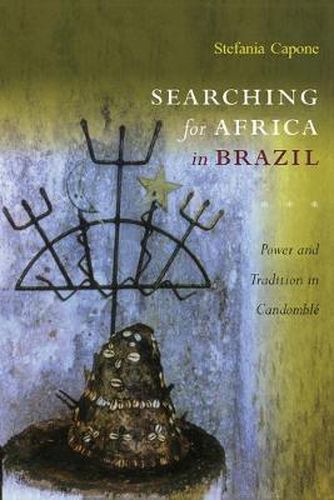Readings Newsletter
Become a Readings Member to make your shopping experience even easier.
Sign in or sign up for free!
You’re not far away from qualifying for FREE standard shipping within Australia
You’ve qualified for FREE standard shipping within Australia
The cart is loading…






Searching for Africa in Brazil is a learned exploration of tradition and change in Afro-Brazilian religions. Focusing on the convergence of anthropologists’ and religious leaders’ exegeses, Stefania Capone argues that twentieth-century anthropological research contributed to the construction of an ideal Afro-Brazilian religious orthodoxy identified with the Nago (Yoruba) cult in the northeastern state of Bahia. In contrast to other researchers, Capone foregrounds the agency of Candomble leaders. She demonstrates that they successfully imposed their vision of Candomble on anthropologists, reshaping in their own interest narratives of Afro-Brazilian religious practice. The anthropological narratives were then taken as official accounts of religious orthodoxy by many practitioners of Afro-Brazilian religions in Brazil. Capone draws on ten years of ethnographic fieldwork in Salvador de Bahia and Rio de Janeiro as she demonstrates that there is no pure or orthodox Afro-Brazilian religion.Challenging the usual interpretations of Afro-Brazilian religions as fixed entities, completely independent of one another, Capone reveals these practices as parts of a unique religious continuum. She does so through an analysis of ritual variations as well as discursive practices. To illuminate the continuum of Afro-Brazilian religious practice and the tensions between exegetic discourses and ritual practices, Capone focuses on the figure of Exu, the sacred African trickster who allows communication between gods and men. Following Exu and his avatars, she discloses the centrality of notions of prestige and power-mystical and religious-in Afro-Brazilian religions. To explain how religious identity is constantly negotiated among social actors, Capone emphasizes the agency of practitioners and their political agendas in the return to roots, or re-Africanization, movement, an attempt to recover the original purity of a mythical and legitimizing Africa.
$9.00 standard shipping within Australia
FREE standard shipping within Australia for orders over $100.00
Express & International shipping calculated at checkout
Searching for Africa in Brazil is a learned exploration of tradition and change in Afro-Brazilian religions. Focusing on the convergence of anthropologists’ and religious leaders’ exegeses, Stefania Capone argues that twentieth-century anthropological research contributed to the construction of an ideal Afro-Brazilian religious orthodoxy identified with the Nago (Yoruba) cult in the northeastern state of Bahia. In contrast to other researchers, Capone foregrounds the agency of Candomble leaders. She demonstrates that they successfully imposed their vision of Candomble on anthropologists, reshaping in their own interest narratives of Afro-Brazilian religious practice. The anthropological narratives were then taken as official accounts of religious orthodoxy by many practitioners of Afro-Brazilian religions in Brazil. Capone draws on ten years of ethnographic fieldwork in Salvador de Bahia and Rio de Janeiro as she demonstrates that there is no pure or orthodox Afro-Brazilian religion.Challenging the usual interpretations of Afro-Brazilian religions as fixed entities, completely independent of one another, Capone reveals these practices as parts of a unique religious continuum. She does so through an analysis of ritual variations as well as discursive practices. To illuminate the continuum of Afro-Brazilian religious practice and the tensions between exegetic discourses and ritual practices, Capone focuses on the figure of Exu, the sacred African trickster who allows communication between gods and men. Following Exu and his avatars, she discloses the centrality of notions of prestige and power-mystical and religious-in Afro-Brazilian religions. To explain how religious identity is constantly negotiated among social actors, Capone emphasizes the agency of practitioners and their political agendas in the return to roots, or re-Africanization, movement, an attempt to recover the original purity of a mythical and legitimizing Africa.